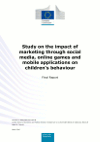 The European Online Games, Social Media and Mobile Application sector has grown substantially in recent years and children are exposed to increasingly sophisticated marketing techniques online which are often outside the purview of existing regulatory frameworks. This study aims to provide a better understanding of online marketing to children and to inform effective policy measures for the protection of children as consumers. The study uses a range of information sources, including a systematic literature review, a review of legislation and regulatory framework at EU and Member State level, in-depth analysis of games, focus groups with parents and children, a survey with parents, and behavioural experiments on advergames and in-app purchases. The study finds that online marketing practices have an impact on children, and that children have difficulties recognizing marketing content, in activating defence mechanisms and in taking decisions. The analysis also shows that although parents play an important role in mediating their children's online behaviour, parents are often not fully aware of the risks their children are exposed to in online environments. The study concludes with policy recommendations focussing on policies to address children as a particularly vulnerable consumer group.
The European Online Games, Social Media and Mobile Application sector has grown substantially in recent years and children are exposed to increasingly sophisticated marketing techniques online which are often outside the purview of existing regulatory frameworks. This study aims to provide a better understanding of online marketing to children and to inform effective policy measures for the protection of children as consumers. The study uses a range of information sources, including a systematic literature review, a review of legislation and regulatory framework at EU and Member State level, in-depth analysis of games, focus groups with parents and children, a survey with parents, and behavioural experiments on advergames and in-app purchases. The study finds that online marketing practices have an impact on children, and that children have difficulties recognizing marketing content, in activating defence mechanisms and in taking decisions. The analysis also shows that although parents play an important role in mediating their children's online behaviour, parents are often not fully aware of the risks their children are exposed to in online environments. The study concludes with policy recommendations focussing on policies to address children as a particularly vulnerable consumer group.
Download: Study on the Impact of Marketing through Social Media, Online Games and Mobile Applications on Children's Behaviour (.pdf, 12.061 KB).
Download from eHealthNews.eu: Study on the Impact of Marketing through Social Media, Online Games and Mobile Applications on Children's Behaviour (.pdf, 12.061 KB).